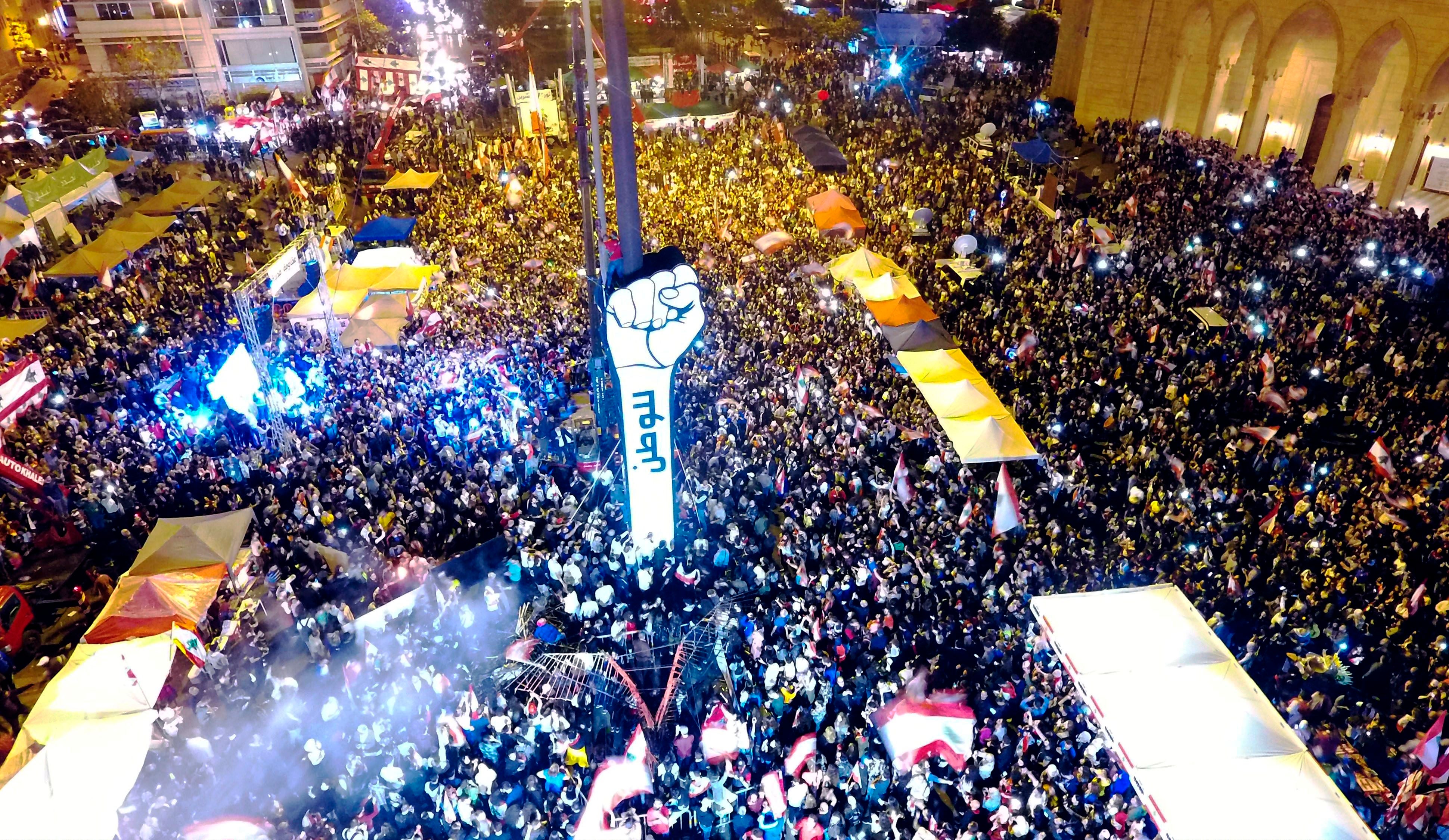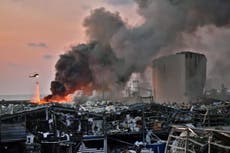‘Our hell’: One year on from Lebanon’s October Revolution, the best option for many is leaving
‘There are two classes of people left in Lebanon, those stuck in a deep hole and those looting the country’ activist tells Bel Trew


Had Rula Stephan not made the last-minute decision to take her children to church on the evening of Tuesday 4 August, they might have all been killed.
Her husband, the sole family member to stay home, only survived because he went to the roof to look at a fire which loomed above Beirut port just a few hundred metres in front of him.
The mother-of-five and an activist says it was a “miracle” the devastating pressure wave threw him backwards across the width of the building, otherwise he would have plunged to his death.
“We lost our home, our things, all our offices, everything was facing the port,” Stephan, 48, says on the phone from Greece where she now lives.
“I found it too dangerous for my kids, I don’t want them to live like this. I gave up hope and had to get out of there.”
“I left Lebanon because I didn’t believe [in it] any more.”
Like many people in Lebanon, Stephan left the country after the blast to build her life elsewhere.
Exactly one year ago, like countless others, she felt very differently.
She had been a leading protester in Lebanon’s uprising that erupted on 17 October as the country’s economy, ravaged by decades of corruption and mismanagement, began to spiral.
For months, tens of thousands of protesters took to the streets across the country demanding a deep overhaul of the ruling class.
It was quickly dubbed Lebanon’s Arab Spring revolution and as the demonstrations gathered pace, the then prime minister Saad Hariri resigned. There were promises of real change, and the streets crackled with expectation and potential.
Stephan, who had taken her children to the “euphoric” demonstrations, says everyone believed it was a tipping point.
“No one was talking about religion or sects or class. Everyone was united. It was something indescribably beautiful,” she adds.
But fast-forward 12 months, after the collapse of the economy and the 4 August blast, many protesters like Stephan have left or are leaving Lebanon. Others have scrimped and saved to send their children abroad. Those who do not have the means to leave, describe feeling utterly hopeless.
And so despite conditions worsening, the rallies have died down. There are protests called on Saturday to mark the one-year anniversary of the October uprising, which will end in a vigil at Beirut port. But few now believe it will amount to any real change.
“People are worrying about how they are going to feed their children. Instead of coming to the streets, they are fighting for their lives,” says Rula Halabi, 48, another prominent activist who lost three friends in the blast and whose offices were destroyed.
She says that 80 per cent of her friends who survived the explosion have now left the country. Anyone who has stayed has tried to send their children away.
The poorer classes are destitute, the middle class is slowly disappearing, she adds.
“There are only two classes of people left, those stuck in a deep hole and those who are steering and looting the country,” she continues from the destroyed remnants of her business.
“We’re suffocated from all sides, and everyone is leaving.”
The authorities were blamed for the 4 August blast that killed over 200 people and injured nearly 7,000 more. The president, the prime minister and the cabinet knew about the poorly-stored explosive materials at Beirut port but did nothing about it.
They have also been blamed for the nosediving economy. Since the start of the year the Lebanese lira has tumbled by 80 per cent in value while the price of basic goods has more than doubled.
Nearly 60 per cent of the country now lives below the poverty line, according to the authorities, compared to before the start of the uprising, when it was around a third of the population.
Experts have warned of hyperinflation during the coming winter months as the government has said it will have to cut subsidies on essentials like medicine, fuel, bread and electricity, a move which could see prices instantly quadruple.
But little to no reform has been implemented largely due to political deadlock in the country.
The astonishing lack of response from the authorities in the wake of the blast sparked a fresh wave of demonstrations in August, which eventually led to the entire cabinet stepping down again.
A new prime minister - Mustapha Adib - was chosen, but he resigned in September before he was even inaugurated.
The latest attempt to hold discussions to choose yet another premier was postponed again on Wednesday. Instead the most likely candidate to be prime minister is Mr Hariri.
“They have taken away our dignity, our money, our home. It is a crisis beyond imagination,” says Mariana Webhe, a public relations consultant, who first spoke to The Independent last November when she was protesting every day.
Like Halabi, these days Webhe is more focused on initiatives to help people after the explosion. She set up Bab wa Shabek (meaning door and window) that has repaired 265 damaged homes for free and is working on fixing 220 more. The government has so far fixed nothing.
“[On 4 August] we were at our homes, our offices, in cafes with our children, and within seconds we were walking on streets of bodies and shattered glass and blood,” she continues, describing life in Lebanon as “our hell”.
“October 17 was hope, rage and anger but so much hope. Right now, it feels hopeless.”



Join our commenting forum
Join thought-provoking conversations, follow other Independent readers and see their replies
Comments